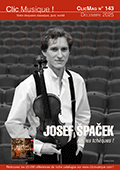 Du compositeur et guitariste Ludovico Roncalli (1654-1713) on connait la Passacaille qui fut reprise et orchestrée par Respighi dans ses Antische danze ed arie par luto en 1931. Mais Roncalli est avant tout l'auteur d'un recueil publié en 1692 intitulé Caprici armonici sopra la chitarra spagnola que nous propose dans ce double disque le luthiste et spécialiste de la guitariste baroque Bernhard Hofstotter. Il s'agit de neuf Suites organisées de façon semblable : un Prélude libre, une Allemande, une Courante, une Sarabande, un Menuet et une Gigue suivis d'une Gavotte ou d'une Passacaille. Si l'on reconnaît d'emblée l'influence du style français dans la succession des danses, la composition de ces Suites doit aussi au Second Livre de Guitare du Bolonais Angelo Michele Bartolotti, publié en 1656 pour la cour de Christine de Suède, et aux Livres de Guittarre de Robert de Visée plus tardifs dédiées à Louis XIV. Hofstostter dont on admire une fois de plus l'éloquence du jeu (Préludes Sarabandes et Passacailles) ainsi qu'un doigté d'une grande vélocité dans les danses, joue sur une guitare à cinq chœurs instrument emblématique de l'époque auquel ces Suites sont destinées. Une belle découverte. (Jérôme Angouillant)  New pieces for recorder consort, written for and dedicated to the talents of a young Dutch ensemble with a growing catalogue of critically acclaimed recordings. For their ‘commitment, technical versatility, unanimity of ensemble and near-immaculate tuning’ (Gramophone) the five musicians of Seldom Sene have won golden opinions in repertoire ranging from songs and dances from Renaissance Spain and England to their own transcription of Bach’s Goldberg Variations: "With passionate command, skilful precision, nuanced dynamics and their outstanding potential for colouring, the ensemble succeeds in creating a surprising spectrum of enchanting, unheard-of sounds from Bach's Variations without compromising the “idea” of the work" (MDR.de). Now they undertake a new adventure, having commissioned pieces from four composers of diverse backgrounds and idioms. Aspasia Nasopoulou has written a collection of 10 miniatures – ‘Dipoles’ – which are inspired by opposites such as Male/Female, Bent/Straight, One/Many and so forth, giving rise to a cycle of high contrasts. Her fellow Greek composer Thanasis Deligiannis plays on the talents of Seldom Sene as singers as well as instrumentalists in setting a triptych of texts in English by the poet Iacovos Camhis, with the whimsical title of a bit unfair. Sören Sieg’s work brings together the joyful and relaxed temperament of much African music with the dramatic tension of European music. As a multi-talented composer and performer on wind, string and keyboard instruments he has composed 24 recorder suites: this is the latest, titled Mathongo Amnandi, meaning ‘sweet Dreams’ in Xhosa. Finally Seldom Sene play Quo quondam victa furore ('Where once madness excelled') by the Dutch composer Paul Leenhouts: a character piece telling a pastoral story from Roman literature which extols the virtues of a simple country life. Leenhouts, too, has a background in early music, as a distinguished performer and director in his own right: like the others, he has composed a vividly communicative piece which is beautifully tailored to the talents of Seldom Sene.
 |
